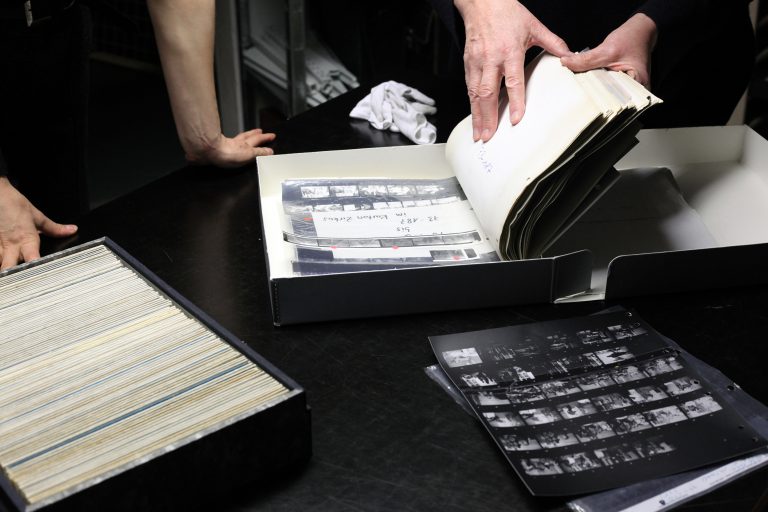Linda Conze: What was your reason for bringing Lighting the Archive[1] to life?
Rebecca Wilton: The discussion around planning a federal institute for photography in Germany, which is highly charged in terms of cultural policies, and which is being conducted by several political groups, brought us together in spring 2020.[2] In summer 2019, the state minister of culture of that time, Monika Grütters, had set up a committee of experts (including Ute Eskildsen, Thomas Weski and others) to develop a concept. In addition to specific suggestions on content, this committee supported Essen as the location. However, on the initiative of an association around the artist Andreas Gursky with the same goal—setting up a photo institute, although with different emphases in terms of content—the city of Düsseldorf, the federal state of North-Rhine Westphalia and the federal government, acting in parallel, had already approved funding for such an institute in Düsseldorf. And then other cities registered their interest in an institute. Consequently, Monika Grütters commissioned a feasibility study, which examined various sites and approved of Essen as a suitable location. The debate had been focused, therefore, primarily on the location. We asked ourselves: who were the people conducting these debates and what is their agenda? What should be covered by such an institute? Is a central institute even needed? And who had codetermination rights? We reached the conclusion that many voices directly affected by this future institute are not adequately represented: above all, the voices of the photographers themselves. And so, we started to hold meetings with them and ask them about it. We were less concerned about their attitudes to an institute for photography and what they thought it might look like than about how they currently manage their material, preserving and archiving it. Because the establishment of an archive and the management of lifetime and posthumous records has always been named as a major activity of the institute.
LC: Do you see yourselves as documenting the approaches of these photographers or do your own approaches play a role in the work?
Maren Lübbke-Tidow: As a group,of course, we have various approaches and points of view, and the way we pose our questions no doubt also suggests the direction taken by one or the other response. But, as much as possible, we want to react to our interlocutors. Our work here is process oriented. Consequently, that sometimes means tolerating pauses and permitting open endings. It also means that we often enter into lengthy editorial loops and that some conversations have to be interrupted and restarted. Indeed, some of the interviewees threw the conversations back at us. We believe that this is less due to us than to the fact that the topics we touch on can be sensitive. For, in the first place, we ask very personal questions about the organizational criteria or the archival structures of their own work. These criteria have often not been thought through, and that provokes stress. And, in the second place, we put political questions when we ask our interlocutors about their attitude towards a potential institute for photography. In this case, not everyone wants to make a specific statement, either because they haven’t followed the debate in all its details, or else because they don’t feel comfortable about saying anything explicit about politics.
When we ask the right questions, we are at best good listeners, and therefore documentarists too—with the courage to leave gaps. Sometimes we succeed in asking questions to which our interviewees have not yet given much thought, but which inspire them. Those are the great moments: when the thought of one person enthuses the other.
That works in both directions.
(…)
Find the whole conversation in the ‟In Focus” section of Eikon – International Magazine for Photography and Media Art, #117 2022, pp. 53–63.
[1] See lightingthearchive.org.
[2] Heinz Peter Knes, Kristin Loschert, Maren Lübbke-Tidow, Heidi Specker, Rebecca Wilton.
